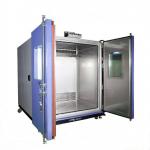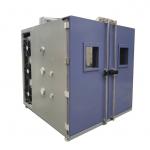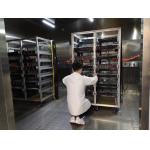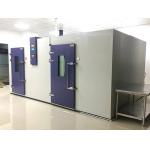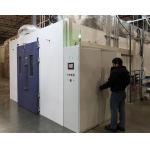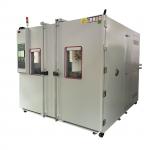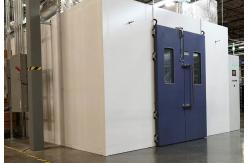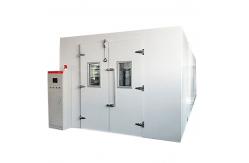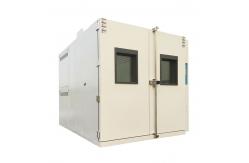In the modern automotive landscape, the role of electronics and
electrical systems has become indispensable. These systems govern
everything from engine control and safety features to in-car
entertainment and connectivity. The Customized Walk-In
Environmental Chamber, designed specifically for testing car
electronics and electrical systems, emerges as a crucial tool in
ensuring the seamless operation and reliability of these vital
components. This state-of-the-art chamber is dedicated to subjecting automotive
electronics and electrical systems, such as engine control units
(ECUs), infotainment systems, sensors, and wiring harnesses, to a
comprehensive range of environmental stressors. It serves
automotive manufacturers, Tier 1 suppliers, and research
institutions. The primary objective is to simulate the diverse and
often harsh conditions that these systems encounter during a
vehicle's lifespan, including temperature extremes, humidity
fluctuations, vibration, and electromagnetic interference. By
conducting thorough tests in this chamber, potential weaknesses and
failure points can be identified and rectified, leading to enhanced
vehicle safety, performance, and customer satisfaction. - Spacious and Secure Design
- The walk-in chamber is constructed with a heavy-duty framework,
typically made of corrosion-resistant stainless steel or
high-strength alloy. This ensures durability and stability,
allowing for the accommodation of large and complex automotive
electronic assemblies. The interior is designed to provide a
controlled and isolated environment. It is lined with an
electrically conductive and EMI shielding material to prevent
external electromagnetic interference from affecting the test
results and to contain any electromagnetic emissions generated by
the tested systems. The door is engineered with a reliable sealing
mechanism, incorporating a high-quality gasket and a multi-point
locking system, ensuring an airtight and EMI-tight enclosure. The
chamber also features a large viewing window made of toughened,
EMI-shielded glass, allowing for visual inspection of the testing
process without compromising the integrity of the test environment.
- Precision Environmental Control Systems
- Temperature Control: Capable of maintaining a wide temperature
range, from -50°C to +120°C, with an accuracy of ±0.5°C. It
utilizes advanced refrigeration and heating technologies, such as
cascade refrigeration for extreme cold applications and high-power
heating elements for rapid temperature elevation. The control
system incorporates a sophisticated feedback loop, with multiple
temperature sensors strategically placed throughout the chamber,
ensuring uniform temperature distribution and minimal temperature
gradients. The user-friendly control panel allows for precise
programming of temperature profiles, including ramp rates, dwell
times, and cycling sequences, enabling the replication of
real-world temperature variations, such as the cold start of a
vehicle in winter or the heat build-up in an engine compartment
during operation.
- Humidity Control: The humidity control system is equally precise,
capable of achieving humidity levels from 5% to 95% RH (Relative
Humidity), with an accuracy of ±2% RH. It employs a combination of
steam humidifiers and dehumidifiers, along with a carefully
designed air circulation system. The chamber is equipped with
humidity sensors that continuously monitor the internal humidity,
and the control system adjusts the humidification or
dehumidification processes accordingly. This allows for the
creation of stable and dynamic humidity environments, mimicking the
diverse moisture conditions that automotive electronics may face,
from the dry air of a desert to the humid atmosphere of a tropical
region. The system also includes a condensate removal mechanism to
prevent any water accumulation within the chamber, safeguarding the
tested samples and the chamber's internal components.
- Vibration and Shock Simulation: To replicate the vibrations and
shocks experienced by a vehicle during normal driving and in
extreme conditions, the chamber is equipped with a high-performance
vibration and shock test system. It can generate a wide range of
frequencies and amplitudes, simulating everything from the gentle
vibrations of a smooth highway drive to the severe shocks of a
pothole or a collision. The vibration table is adjustable and can
be programmed to follow specific vibration profiles, allowing for
accurate testing of the durability and reliability of electronic
components and their solder joints under different mechanical
stress conditions.
- Electromagnetic Interference (EMI) and Compatibility Testing: The
chamber is designed to conduct comprehensive EMI and compatibility
testing. It is equipped with signal generators, antennas, and
spectrum analyzers to create and measure electromagnetic fields.
This enables the evaluation of how automotive electronics perform
in the presence of external EMI sources, such as radio
transmissions, cell phone signals, or other vehicle electronics. It
can also test the emissions generated by the tested systems to
ensure they do not interfere with other vehicle components. The
chamber can be configured to meet various automotive EMI standards,
such as CISPR 25 and ISO 11452, providing a reliable platform for
ensuring electromagnetic compatibility.
- Advanced Instrumentation and Data Acquisition
- The chamber is outfitted with a comprehensive suite of sensors and
instrumentation. In addition to temperature, humidity, vibration,
and EMI sensors, it includes sensors for measuring electrical
parameters such as voltage, current, and resistance. These sensors
are connected to a state-of-the-art data acquisition system that
records and stores all the relevant data. The data acquisition
system offers a high sampling rate, typically ranging from 100 to
1000 samples per second, ensuring that even the most rapid changes
in environmental conditions or electrical parameters are accurately
captured. The collected data can be accessed and analyzed in
real-time or retrieved later for in-depth studies. The system is
also compatible with automotive-specific data analysis software and
can generate detailed reports and graphs, facilitating the
interpretation and communication of test results.
- Safety and Compliance Features
- The Customized Walk-In Environmental Chamber is designed with
multiple safety features. It has an automatic shutdown system in
case of any critical malfunction, such as overheating,
over-humidity, or excessive EMI levels. The chamber is also
equipped with a fire suppression system, which can quickly
extinguish any potential fires that may occur due to electrical
faults. The EMI shielding and grounding of the chamber are designed
to protect the operators from any harmful electromagnetic
radiation. Additionally, the chamber complies with relevant
automotive testing standards, such as ISO 16750 and SAE J1455,
ensuring that the testing procedures are reliable and recognized
within the industry.
- Chamber Size and Capacity: The walk-in chamber is available in various sizes, with interior
volumes ranging from a few cubic meters to larger configurations
suitable for testing entire vehicle electrical systems. For
example, a smaller chamber might have an interior volume of 5 cubic
meters, while a larger one could be 20 cubic meters or more. The
interior dimensions are optimized for proper air circulation and
uniform environmental parameter distribution, ensuring that all
parts of the tested samples are effectively exposed to the
simulated conditions.
- Temperature Cycling Rate: Can perform temperature cycles at a rate of several cycles per
day, depending on the specific test requirements. For example, it
can conduct 2 to 4 cycles per day between -30°C and +80°C,
subjecting the electronic systems to repeated and rapid thermal
stress, which is essential for evaluating their resistance to
thermal fatigue and their ability to function reliably in
fluctuating temperature environments.
- Humidity Cycling Rate: The humidity can be cycled at a rate that allows for the
simulation of rapid changes in moisture conditions. The chamber can
adjust the humidity levels within a short period, typically within
10 to 30 minutes, depending on the desired test scenario,
replicating the sudden humidity shifts that may occur during a
vehicle's operation, such as driving from a dry garage into a humid
outdoor environment.
- Vibration and Shock Parameters: The vibration system can generate frequencies ranging from 5 Hz
to 2000 Hz, with amplitudes up to 50 mm. The shock pulses can have
durations from 10 milliseconds to 50 milliseconds and accelerations
up to 1000 m/s². These parameters can be adjusted and programmed to
simulate various driving conditions and impacts.
- EMI Testing Range: The chamber can generate and measure electromagnetic fields in
the frequency range from 10 kHz to 18 GHz, covering the frequencies
of most common EMI sources and the operating frequencies of
automotive electronics. The field strengths can be adjusted from a
few volts per meter to several hundred volts per meter, allowing
for comprehensive EMI susceptibility and emission testing.
- Data Acquisition Rate: The data acquisition system can sample sensor data at a rate of
500 samples per second, ensuring that even the most minute and
rapid changes in temperature, humidity, vibration, EMI, or
electrical parameters during the test are accurately recorded and
can be analyzed in detail. This high sampling rate provides
valuable insights into the performance and potential failure modes
of the automotive electronics and electrical systems.
- Compliance with Automotive Standards: Complies with a range of automotive industry standards, including
ISO 16750 for environmental testing, CISPR 25 for electromagnetic
compatibility, and SAE J1455 for vibration and shock testing. This
ensures that the testing is conducted in a consistent and
recognized
|
